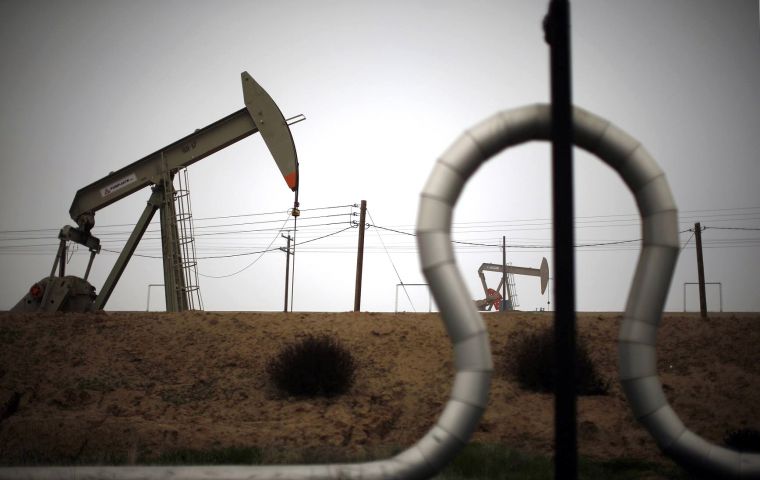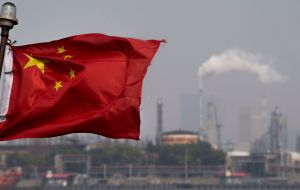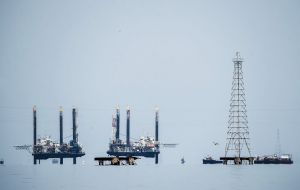MercoPress. South Atlantic News Agency
Oil price slumps 8% to lowest in more than a year: Crude supply grows faster than demand
 Oil supply, led by U.S. producers, is growing faster than demand and to prevent a build-up of unused fuel, OPEC is expected to start trimming output
Oil supply, led by U.S. producers, is growing faster than demand and to prevent a build-up of unused fuel, OPEC is expected to start trimming output  A trade war between the world’s two biggest economies and oil consumers, the United States and China, has weighed upon the market.
A trade war between the world’s two biggest economies and oil consumers, the United States and China, has weighed upon the market.  Brent crude futures settled down US$ 3.80 a barrel, or 6.1% at US$ 58.80. During the session, the benchmark dropped to US$ 58.41, the lowest since October 2017.
Brent crude futures settled down US$ 3.80 a barrel, or 6.1% at US$ 58.80. During the session, the benchmark dropped to US$ 58.41, the lowest since October 2017. Oil prices slumped up to nearly 8% to the lowest in more than a year on Friday, posting the seventh consecutive weekly loss, amid intensifying fears of a supply glut even as major producers consider cutting output. Oil supply, led by U.S. producers, is growing faster than demand and to prevent a build-up of unused fuel such as the one that emerged in 2015, the Organization of the Petroleum Exporting Countries is expected to start trimming output after a meeting on Dec. 6.
But this has done little so far to prop up prices, which have dropped more than 20% so far in November, in a seven-week streak of losses. Prices were on course for their biggest one-month decline since late 2014.
A trade war between the world’s two biggest economies and oil consumers, the United States and China, has weighed upon the market.
“The market is pricing in an economic slowdown - they are anticipating that the Chinese trade talks are not going to go well,” said Phil Flynn, an analyst at Price Futures Group in Chicago, referring to expected talks next week between U.S. President Donald Trump and his Chinese counterpart Xi Jinping at the G20 summit in Buenos Aires.
“The market doesn’t believe that OPEC is going to be able to act swiftly enough to offset the coming slowdown in demand,” Flynn said.
Brent crude futures settled down US$ 3.80 a barrel, or 6.1% at US$ 58.80. During the session, the benchmark dropped to US$ 58.41, the lowest since October 2017.
U.S. West Texas Intermediate crude (WTI) lost US$ 4.21, or 7.7%, to trade at US$ 50.42, also the weakest since October 2017. In post-settlement trade, the contract continued to fall.
For the week, Brent fell 11.3% and WTI posted a 10.8% decline, the largest one-week drop since January 2016.
Market fears over weak demand intensified after China reported its lowest gasoline exports in more than a year amid a glut of the fuel in Asia and globally.
Stockpiles of gasoline have surged across Asia, with inventories in Singapore, the regional refining hub, rising to a three-month high while Japanese stockpiles also climbed last week. Inventories in the United States are about 7% higher than a year ago.
Crude production has soared as well this year. The International Energy Agency expects non-OPEC output alone to rise by 2.3 million barrels per day (bpd) this year while demand next year was expected to grow 1.3 million bpd.




Top Comments
Disclaimer & comment rulesCommenting for this story is now closed.
If you have a Facebook account, become a fan and comment on our Facebook Page!